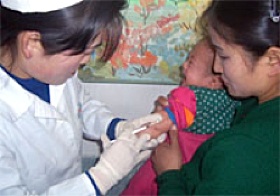 The Measles Initiative this week announced it has vaccinated one billion children in more than 60 developing countries, making significant gains in the global effort to stop measles.
The Measles Initiative this week announced it has vaccinated one billion children in more than 60 developing countries, making significant gains in the global effort to stop measles.
The child who received the history-making measles vaccination was one of 3.5 million immunized in Mozambique this May. The Measles Initiative began in 2001 with five founding partners – the American Red Cross, United Nations Foundation, U.S. Centers for Disease Control and Prevention, UNICEF, and World Health Organization. In 1980, before such vaccination programs, measles caused an estimated 2.6 million deaths each year.
“When we started the Measles Initiative ten years ago, we knew that we would help save millions of lives, but we never imagined where the world’s support would take us,” said David Meltzer, senior vice president of international services with the American Red Cross. “With every dollar donated, we vaccinated another child. Across the globe, we stopped outbreaks, improved treatment and protected future generations from one of the world’s deadliest diseases.”
Even as the Measles Initiative’s founding partners marked this significant achievement, they warned that governments and the global health community should not continue to redirect their resources elsewhere. Funding for the Measles Initiative decreased from a high of $150 million in 2007 to $68 million in 2010.
Since 2009, widespread outbreaks affecting 30 countries in sub-Saharan Africa have resulted in more than 320,000 new measles cases and more than 2,400 measles-related deaths.
India, however, is continuing to bolster their vaccination schedule. Three out of four children who died from measles in 2008 lived in India, where persistently low vaccination coverage was the norm. Last year, however, the country initiated measles vaccination campaigns in select districts and has plans to organize additional vaccination campaigns throughout the next two years. India, with a population of more than 1 billion, plans to self-finance these efforts.



















